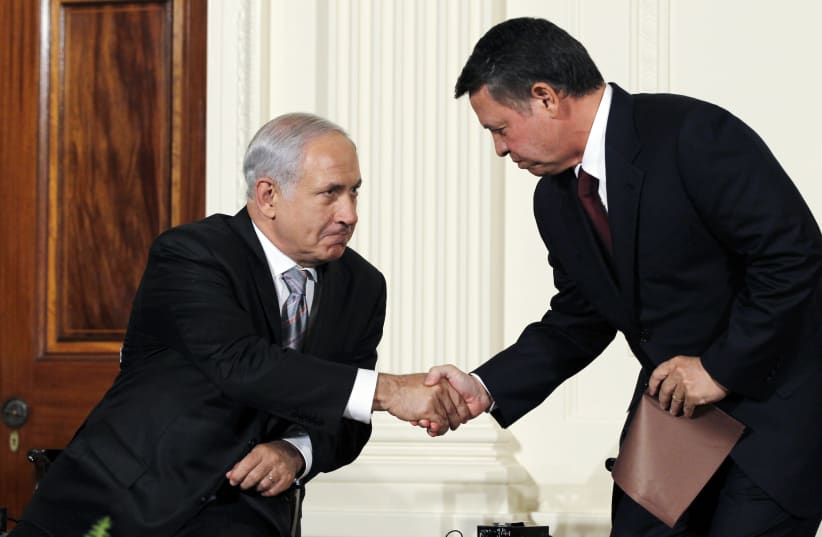On Thursday, a Jordanian government spokesperson said Israel had “strongly apologized” for the July incident in which two Jordanians were killed at the Israeli Embassy compound in Amman and promised to compensate the victims’ families.
Israel had announced Thursday that “authorities will continue reviewing the materials regarding the July 2017 incident and anticipate making a decision in the coming weeks."Israel also promised to take “legal measures” in the case, Jordanian spokesman Mohammed Momani said, without specifying what they would be.The move appears to bring to a close one of the worst crises in Jordanian-Israeli relations since the two countries signed a peace treaty in 1994.An apology and compensation were also offered for a second case that was a point of contention between the two countries, the March 2014 shooting under disputed circumstances of Raed Zeiter, a Jordanian magistrate’s court judge, by an IDF soldier at the Allenby Bridge.In a statement to the official Petra news agency, Momani said Jordan has agreed to accept the return of the Israeli ambassador to Amman “in light of the Israeli memorandum, especially as it included all the terms the Jordanian government asked for.”He said the Foreign Ministry “received an official memorandum from the Israeli Foreign Ministry expressing the strong apology of the Israeli government and strong regret for what happened in Amman in July, which resulted in the killing of the two Jordanian citizens,” and for the incident in which Zeiter was killed.The memorandum included an Israeli commitment for “settling and safeguarding relations and resuming cooperation,” Petra reported.The news agency said the Jordanian government had “contacted the families of the martyrs, who accepted the apologies and compensation.”The embassy in Amman has been closed since July, when an Israeli guard, Ziv Moyal, shot dead two Jordanians, Mohammed Jawawdeh and Bashar Hamarneh.Israel’s Foreign Ministry said at the time that Moyal acted in self-defense after being stabbed with a screwdriver by 17-year-old Jawawdeh.Hamarneh, a physician, was a bystander. He was the owner of the apartment in which the incident occurred, where Jawawdeh, according to Jordanian accounts, had come to install furniture.Many Jordanians disagreed with King Abdullah’s decision at the time to allow Moyal to return to Israel.But what inflamed matters further was that Prime Minister Benjamin Netanyahu’s staff released a video of the premier hugging and praising Moyal in his office after the latter’s return. Netanyahu said Moyal had handled himself well and that he was “happy things ended the way they did.”This act caused widespread revulsion in Jordan and acutely embarrassed Abdullah in front of his people.The king lashed out at Netanyahu’s “provocative” behavior, saying the prime minister needed to “honor his responsibilities and take the necessary legal measures to ensure the killer is tried and justice is served rather than exhibiting political showmanship in dealing with this crime to score personal political points.”Jordan Times columnist Daoud Kuttab summed up the public mood after the incident: “People want him [Moyal] to be tried for the crime he did. They don’t want to see him hanging out in Tel Aviv. They want some kind of justice.”“People don’t understand how he would be able to get away with murder,” he said.Jordanian officials said the Israeli Embassy in Amman would stay shut until Moyal is brought to trial. But in Israel’s view, he had staved off a terrorist attack, and there were no grounds for trying him.The deadlock and the lack of a functioning embassy harmed the ties between the countries even though security cooperation continued.As a result of the crisis, there has been no issuing of visas for Jordanians who wanted to work with Israelis, the ambitious plan for a pipeline to transfer water from the Red Sea to the Dead Sea came under question, economic cooperation was damaged and negative attitudes toward Israel in Jordanian public opinion were reinforced.
